Dealing With Bankroll Management
Fund roll management is basically about managing the money you set aside for particular financial operations. It entails setting aside a particular amount for different financial objectives, such gaming or investing, making sure you never overreach yourself and risk losing everything at once. Good bankroll management guarantees that people may survive unavoidable losses without running out of money and also seize possibilities when they present themselves.
In sports betting, for instance, a well-managed bankroll could imply betting modest amounts depending on your overall resources, so preventing a run-through of bad bets from ruining you. In stock trading, bankroll management—that is, not placing too much money into one trade and diversifying investments to distribute risk—means Individuals run the danger of losing everything in a short period of time without good bankroll management since bad judgments and emotional responses can cause overspending and major losses.
Value Of Financial Literacy For Bankroll Management
Making wise selections in bankroll management requires a basis in financial literacy. It’s about knowing how money works, the ideas of investing, the risks involved, and how to schedule for both short- and long-term financial goals. Financial literacy enables people to understand how to establish a sustainable strategy, how to balance risk with reward, and how to assess the performance of their financial endeavors over time in terms of bankroll management.
A fundamental component of financial literacy is knowledge of risk. Every financial action has some degree of risk; people have different tolerance for this risk. Being financially literate helps people to recognize high-risk activities and modify their bankroll plans. Whether it’s a bad run in a https://www.newportorhotel.com/ game or a market slump, someone who is well-versed in their financial constraints will make judgments that guarantee they can withstand the natural volatility that accompany any financial activity.
Risk Control Via Financial Literacy
Risk management is one of main purposes of financial literacy in bankroll control. Those who grasp the foundations of financial planning—that is, those who know how to evaluate risk and diversify their investments—are more suited to guard their bankrolls against catastrophic losses. Financially savvy people will typically follow plans to guard their capital, including only risking a tiny portion of their bankroll in every transaction or bet and building reserves for times when they have a losing run.
The concept of avoiding stuffing all your eggs in one basket is fundamental in risk management. Those that are financially literate are probably going to diversify their activities so as to avoid depending too much on one source of income or investment. This diversification distributes the risk over several regions and helps to cushion the consequences of possible losses, therefore lowering the possibility of losing all their money because of a poor choice. A varied approach is essential for bankroll management whether it comes to allocating investments across several sectors in the stock market or selecting several paths for income producing.
Establishing And Respecting A Budget
Establishing a budget and following it is among the first stages in good bankroll management. Financial literacy emphasizes the need of knowing your financial limits, budgeting, and when to stop losing money. A budget helps people to avoid overextending themselves and to decide how much they can afford to lose. It also enables them to determine, in line with financial stability, how much they can afford to commit or distribute towards a certain business.
For example, a stock trader should be aware of how much of their whole fortune they are ready to expose. Without a well-defined budget, one runs more risk of getting unduly confident in their capacity to forecast market moves, which would result in an emotional investment approach perhaps compromising their bankroll. Being financially literate helps you to develop the practice of saving just a tiny amount of your money for high-risk activities, therefore preserving most of your capital unaltered. This guarantees that the general financial stability stays unaltered even in case the high-risk businesses fail.
The Part Financial Planning Plays In Bankroll Management
Another absolutely vital component of bankroll management is good financial planning. Being financially literate is knowing how to make long-term plans and how to modify tactics in reaction to evolving conditions. Good preparation helps people to distribute money according to their risk tolerance and financial objectives. Knowing exactly how much one can afford to commit to their bankroll, what their goals are, and how much risk they are ready to accept all depend on a clear financial strategy.
By means of financial planning, people can create reasonable expectations for the increase of their bankroll. Finally savvy people understand that bankroll development takes time and calls for consistency and patience instead than sudden success or unsustainable earnings. They also realize that as their financial condition changes, frequent reviews and changes to their strategy are absolutely vital. This strategy guarantees long-term success and helps to avoid burnout—especially in front of unavoidable losses.
Overcoming Emotional Obstacles By Means Of Financial Literacy
Control of emotions is one of the main difficulties in bankroll management. Making illogical decisions when emotionally engaged in your finances is all too simple. Emotions can skew judgment and result in bad decisions whether they be the excitement of a large triumph or the aggravation of a losing run. Financial literacy guides people toward controlling their responses and helps them identify these emotional triggers.
For example, financially savvy people are more inclined to stand back and evaluate the circumstances rationally when confronted with a loss. Pursuing losses or doubling down on transactions or bets would only cause greater problems, they are aware. Conversely, when one is experiencing a win, they are less prone to let success distort their judgment and expose too much too fast. One of the most important abilities a financially educated person may have is the capacity to separate emotions from financial decisions; this helps to preserve good bankroll management.
Read more: Discover the Thrills of LINK NEW88 – Your Gateway to Online Gaming
